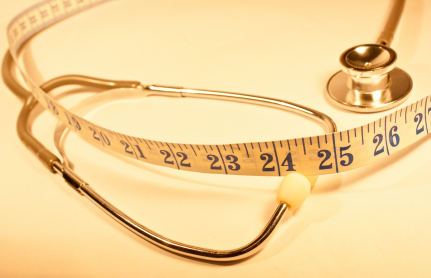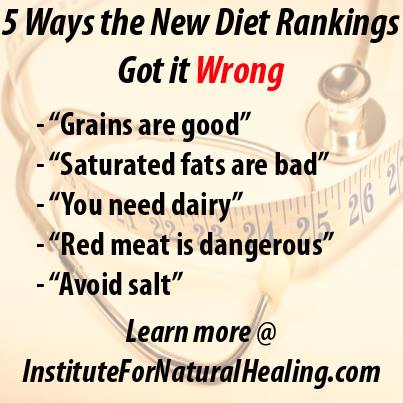The latest diet rankings put out by US News & World Report are completely backwards.
They say a mail-away processed meal plan is a healthier choice than 14 other diets on their list. This includes the Paleo diet, which we recommend it because it’s based on whole foods. In fact, they rated Paleo dead last.1
Trendy diets come and go. But knowing what makes a food beneficial to your health never goes out of style.
Don’t let their panel of “experts” fool you. Their list is based on old science and faulty logic. Here are 5 misconceptions they used to rate popular diets.
1. “Grains are good”: There’s a lot of misinformation out there about grains. Most people think whole grain products are better than the refined, processed ones. Whole grains can be just as processed. They can also cause an insulin surge in your body like the processed junk.
Grains are also high in lectins. These molecules cause food allergies and autoimmune disease. Eliminating lectins from your diet is a key factor in reducing inflammation, one of the main causes of major diseases.2
Cutting grains from your diet will help get the lectins out of your life. And don’t worry about missing out on fiber. Artichokes, blackberries, raspberries, and peas all pack more fiber than most grains.
2. “Saturated fats are bad”: For over 50 years doctors have been saying how dangerous saturated fats are to your health. But repeating something over and over doesn’t make it true.
Coconut oil is a good example. For years doctors said to skip it altogether. But now they’re using it to fight Alzheimer’s.3
Saturated fats are the most important food you can eat for overall good health. Your body needs them to work at its best. They’re essential to liver, heart, and brain health. They also help you absorb vitamins A, D, E, and K.4
Where you get your fat from plays a big part in whether or not it’s “good” for you. Make sure your butter (or ghee) comes from grass-fed cows. Always buy organic olive and coconut oils whenever possible.
3. “You need dairy”: It causes an inflammatory response in all of us. Consuming it on a regular basis leads to a chronic state of inflammation that puts your health in danger.
Milk is the worst offender. That’s because it’s hard to find the genuine article. Unless your milk says otherwise, it’s full of synthetic hormones. And that’s not all it’s full of, either. Pasteurization supposedly makes milk “safe” to drink. But that doesn’t stop it from containing traces of prescription drugs and other nasty surprises. This includes Pyrimethamine, an anti-Malaria drug.5
Afraid of missing out on all the nutrition that experts say milk has to offer? Don’t be. You can find these nutrients from other foods that don’t cause inflammation. You can get calcium from leafy green vegetables, vitamin D from eggs, and protein from grass-fed beef.
4. “Red meat is dangerous”: Just like saturated fat, red meat gets a bad rap in the mainstream. They say it causes disease and makes you fat. But they’re not talking about the right beef.
Grain-fed beef is inflammatory. It’s also pumped full of drugs and hormones. But grass-fed beef is a different story. It has more CLA and B vitamins than grain-fed beef. It’s also higher in calcium, magnesium, and omega-3 fatty acids.6 And it has less trans-fats and omega-6 fatty acids than grain-fed beef.7
Unlike the mainstream’s version of red meat, grass-fed beef lowers inflammation and protects your heart. And don’t worry about adding the extra protein to your diet. Eating about half a gram of protein per pound of body weight each day helps you burn fat and build muscle.8
5. “Salt is your enemy”: Your body needs salt. It takes about 500 mg of it every day just for you to stay alive.9 That’s because sodium plays a huge role in fluid balance and nervous system function. But it also makes your heart work properly.
If you’ve had an event like a heart attack, low sodium levels triple your risk for a second one. And consuming less than three grams of sodium per day significantly increases your chances of heart disease and stroke.10 But be selective with your salt.
Use sea salt or Himalayan pink salt. They contain trace minerals like magnesium and potassium. The same cannot be said about regular old table salt.
Don’t let “experts” fool you into eating what your body doesn’t need—or not enough of what it does. Their recommendations are based on misconceptions and even misinformation.
Losing weight and improving your health isn’t rocket science. But it’s not as simple as following the most popular, trendy diets.
In fact, we’ve uncovered the real reason you can’t keep off those pesky pounds (and how to finally do it!). Discover how to naturally conquer your weight without pills, without side effects, without starving yourself…while eating delicious food—HERE.
Like this Article? Forward this article here or Share on Facebook.
References:
1 http://health.usnews.com/best-diet/best-overall-diets
2 http://www.ncbi.nlm.nih.gov/pubmed/10884708
3 http://health.universityofcalifornia.edu/2012/06/03/can-coconut-oil-treat-alzheimers/
4 http://articles.mercola.com/sites/articles/archive/2010/02/25/saturated-fat-is-not-the-cause-of-heart-disease.aspx
5 http://www.dailymail.co.uk/sciencetech/article-2012050/The-cocktail-20-chemicals-glass-milk.html
6 http://articles.mercola.com/sites/articles/archive/2013/07/06/grass-fed-beef.aspx
7 http://www.ncbi.nlm.nih.gov/pubmed/16500874
8 http://www.ncbi.nlm.nih.gov/pubmed/23107521
9 http://chriskresser.com/shaking-up-the-salt-myth-the-human-need-for-salt
10 http://www.nytimes.com/2013/05/15/health/panel-finds-no-benefit-in-sharply-restricting-sodium.html?pagewanted=all&_r=0


